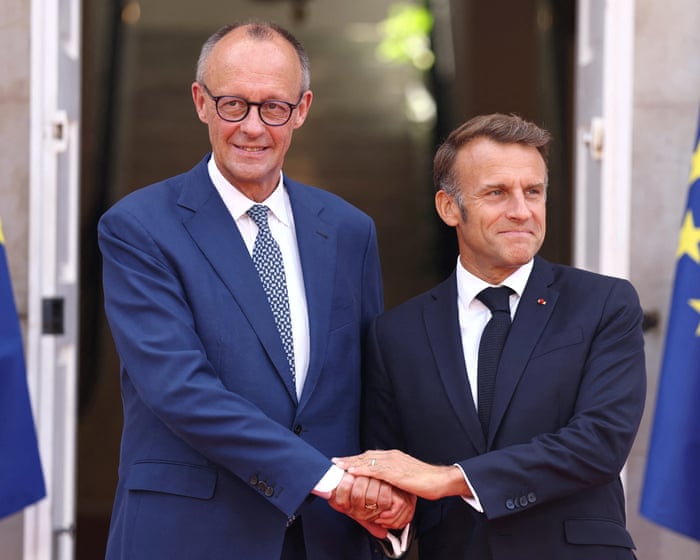Emmanuel Macron spoke with the tone of a grieving man—not angry or defiant, but simply sad. He lamented that Europe is experiencing a “degeneration of democracy.” The French president pointed to external threats from Russia, China, and powerful U.S. tech companies and social media entrepreneurs. “But we should not be naive,” he added. “Internally, we are turning against ourselves. We doubt our own democracy… Everywhere we look, something is happening to our democratic fabric. Democratic debate is becoming a debate of hatred.”
Macron knows this reality well, caught between the bitter extremes of the right and left. Yet France, often called “ungovernable,” is not alone in its deep divisions. Across Europe, the UK, and the US, distrust and grievances are worsening political dysfunction and social conflict. Macron’s words resonate in almost every country that upholds democratic principles. Faith in democracy as the best form of governance for the modern world is fading, especially among the young, while public discourse grows harsher and more violent.
Macron made these remarks at an event marking the 35th anniversary of Germany’s reunification in 1990—a moment of great hope. Yet today, like France, Germany is deeply polarized and faces a crisis of political faith.
Look around: in recent elections, the Czech Republic joined Poland, Austria, and other EU nations in shifting toward the populist far-right, driven by a wave of anti-establishment sentiment. Support for opportunistic figures who exploit fear and resentment—while offering few credible policies on issues like migration—does not strengthen democracy but undermines it. This rush toward extremes reflects a loss of confidence in the democratic system itself, made worse by declining voter participation among marginalized groups.
In many of these countries, a shared democratic consensus is missing. In Britain, where national flags are clung to like comfort blankets, both major parties are struggling, and alternatives seem implausible or harmful. In the US, the so-called “home of democracy,” effective opposition to one-party Republican rule has largely collapsed at the national level. Donald Trump, by seeking to manipulate electoral districts, increasingly resembles a dictator.
Lack of genuine democratic choice and economic opportunity fuels alienation and unrest in countries as varied as Morocco, Kenya, and Bangladesh, all of which have seen recent turmoil. In the Philippines, Nigeria, Turkey, Indonesia, and Madagascar, corruption and abuse of power have sparked anti-government protests. Last month in Nepal, young people led a “Gen Z revolution.” While these nations differ in many ways, they share one crucial trait: compared to authoritarian regimes like China and Russia, their societies remain relatively open and free—for now.
The fundamental challenge they face is that democracy is not working, or is functioning so poorly that it risks being abandoned. The once-exemplary United States has lost its way, and Western Europe is divided and faltering. Meanwhile, newer democracies in the Global South and Central and Eastern Europe are on the front lines of a renewed Cold War of influence and values against the Beijing-Moscow axis. Like Moldova and Georgia—two recent battlegrounds—their future direction remains uncertain.
A crisis is approaching. According to Freedom House’s annual report, violence, election manipulation, and repression marred more than 40% of national elections held in 2024. Global freedom, measured by political liberties and civil rights, declined for the 19th year in a row. The report concluded that “conflicts spread instability and thwarted democratic progress around the world.”
In the US, a recent survey found a record 64% of Americans believe…Many people believe their democracy is too politically divided to solve the nation’s problems. In the UK, a poll of 16- to 29-year-olds found that 63% think democracy is in trouble. While 57% of young people prefer living in a democracy over a dictatorship, compared to 27% who don’t, only 35% said they would consider getting involved in organized politics.
In Spain, what once seemed impossible is now common: young people are turning to the far right.
If there is a global revolt against democracy, or at least a significant loss of faith in democratic systems, it would be helpful to understand why. Contributing factors include short- and long-term economic issues like the cost of living, inflation, lack of good jobs, de-industrialization, broken communities, institutional failures, wealth inequality, globalization, and mass migration linked to the climate crisis. The myth of endless sustainable growth has also been shattered. Other reasons are untrustworthy leaders, declining moral standards, election interference, and online misinformation spread by Russia and others. Younger generations feel pitted against older populations, and there is widespread hopelessness and anger about the world’s environmental and geopolitical mess.
According to Andreas Reckwitz of Humboldt University in Berlin, this discontent stems from a deep and widespread sense of loss. He argues that the core belief of Western modernity—that human progress is constant and inevitable, and that life always improves—has been shattered by recent decades. Loss has become a common experience, and the challenge is whether societies focused on “better” or “more” can learn to cope with “less” and “worse.”
From this perspective, the rejection of failing democratic systems and the rise of populist leaders promising to return to the past become more understandable. Reckwitz warns that if politics continues to promise endless improvement, it will fuel disillusionment and strengthen populism, which thrives on broken promises and offers only illusions of recovery. The key question, then, is how to deal with loss.
Reckwitz offers his own ideas, emphasizing resilience and redistribution. If anyone has a clear solution, leaders like Macron, who have much to lose, would certainly be eager to hear it.
Simon Tisdall is a Guardian foreign affairs commentator.
Frequently Asked Questions
Of course Here is a list of FAQs about the global fading faith in democracy inspired by the topic with clear and concise answers
General Beginner Questions
1 What does fading faith in democracy actually mean
It means that more and more people around the world are becoming disillusioned with democratic systems They feel that democracy isnt delivering on its promises is corrupt or is too slow to solve big problems
2 Is this really a global problem or is it just in a few countries
Its a widespread global trend While countries like France the United States and Brazil often make headlines studies show declining satisfaction with democracy in many established and newer democracies across Europe Latin America and Asia
3 What are the main reasons people are losing faith in democracy
Common reasons include
Economic Inequality A feeling that the system only benefits the rich and powerful
Political Polarization Extreme division makes governments unable to function effectively
Misinformation The spread of false information online erodes shared facts and trust
Perception of Corruption The belief that politicians are selfserving and not working for the people
4 Whats the alternative to democracy that people are turning to
Some people are becoming more open to nondemocratic alternatives such as strongman rule or technocracy believing they can provide more stability and efficiency
Deeper Advanced Questions
5 How is social media contributing to this crisis
Social media algorithms often promote divisive and emotionally charged content to keep users engaged This deepens political polarization spreads misinformation quickly and can make constructive factbased debate almost impossible
6 Are young people more likely to be disillusioned with democracy
Surveys often indicate that younger generations who have grown up during a time of economic uncertainty and political gridlock are more likely to express dissatisfaction with democracy and are less committed to it as the only form of government compared to older generations
7 Whats the connection between economic problems and democratic decline
When people struggle financially and see a growing wealth gap they often lose trust in the system they feel has failed them This economic anxiety makes them more likely to support populist leaders



